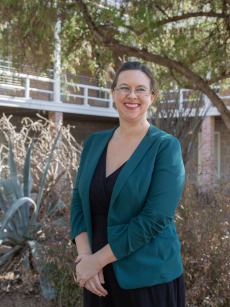
Jasmine R. Linabary is a researcher, educator, and consultant whose work explores how to design more equitable and inclusive spaces for participation. Her research focuses on organizing for social change, new media, and feminist and participatory methodologies. As an engaged scholar and teacher, Dr. Linabary is committed to working with communities and organizations. For example, she has a decade-long relationship with a nonprofit called World Pulse, a digitally based transnational feminist network with members from more than 200 countries. She recently served as lead researcher for the #SheTransformsTech campaign, an effort by World Pulse and 27 coalition partners (e.g., EQUALS, Digital Impact Alliance, World Wide Web Foundation, Wikimedia Foundation) to identify key issues and recommendations for technology companies and policymakers to make technology more equitable. Her current collaborative work with this partner involves a participatory design project looking at efforts to reimagine and “shift the power” in relationships within the women’s development sector.
Dr. Linabary was most recently an Assistant Professor of Communication at Emporia State University (ESU) and the co-founder and director of the EAT Initiative, a collaborative and interdisciplinary effort to combat food insecurity on ESU’s campus and in the Emporia community. She was also the former Associate Director of Research & Operations for the Purdue Peace Project, an initiative dedicated to locally led peacebuilding housed at Purdue University. Her work has been published in outlets such as the Journal of Applied Communication Research, New Media & Society, Big Data & Society, Qualitative Research, Management Communication Quarterly, Journal of International & Intercultural Communication, Conflict Resolution Quarterly, Feminist Review, and Communication Education, among others, and in several edited books. She is also the co-editor of the forthcoming book Are We Making a Difference? Global and Local Efforts to Assess Peacebuilding Effectiveness. Based on her community engagement efforts as well as her mentoring and teaching, Dr. Linabary received the Association of American Colleges & Universities’ K. Patricia Cross Future Leaders Award, recognizing her promise as a future leader in higher education.
Dr. Linabary holds a PhD in Communication from Purdue University, a MA in Communication from California State University, Chico, and a BA in Journalism & Mass Communication from Whitworth University. She also serves as a research and evaluation consultant for nonprofit and other social change organizations.
Dr. Linabary is the team advisor for the Co-Design Collaborative (Co-Lab), a Vertically Integrated Project (VIP) .

